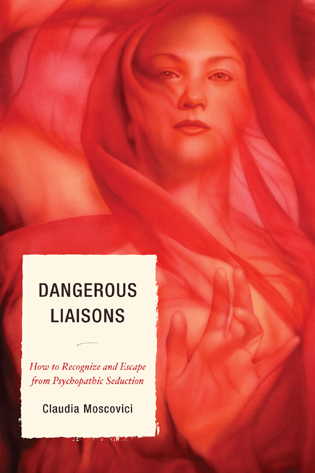Psychopaths are Losers who view themselves as Leaders. As we’ve seen, unless there’s a specific advantage for him, a psychopath never admits to being wrong, to doing wrong, to having wronged anyone. Whatever he does wrong to others–cheating, lying, manipulation, hurting them emotionally and physically–he manages to project blame on the victims and on those around them. In fact, the psychopath will see his cowardly actions as superior; on a higher plane of existence than the rest of humanity. Rather than seeing himself as the pathological person that he is–essentially, a Loser who spends his life parasitically using and taking advantage of others–the psychopath is likely to see and describe himself as a maverick: a lone dissenter, a willfully independent hero “ahead of the pack,” who rejects the dated and commonplace notions of right and wrong and of truth and falsehood. Ethical human beings, who care about others, are considered by the psychopath and his followers “moralistic” and “narrow-minded”.
Like the Nietzschean Superman, the psychopath considers himself beyond the norms of good and evil: except, of course, when it comes to double standards, since no psychopath would want others to use, manipulate, deride and hurt him as he does them. The underlying narcissism that leads the psychopath to focus only on his desires, pleasures and needs also blinds him to his faults and protects him from self-blame. He reframes reality to fit with his narcissistic delusions. Sleaziness, violence, stalking and perversion–-sadistic games played at other people’s expense–are framed as “hedonism”, “childlike innocence and playfulness” or “libertine freedom”. Lies are framed as “creative interpretations of reality” or clever “modes of persuasion”. Manipulativeness, slander and back-stabbing become, in his deranged mind, “Machiavellianism” or “cunning”. As the psychopath’s idiotic grins which often accompany his malicious actions reveal time after time, his behavior and intentions are as far removed from “childlike” or “harmless fun” as possible. “Freedom” too is a meaningless concept, given that his main goal is to trample on the freedom and rights of others. He intends to control and harm others: control by harming them, to be precise. (hence the picture of Valmont, above, from the novel and movie, “Dangerous Liaisons,” which is also part of the title of my book on the subject of psychopathy).
http://www.amazon.com/Dangerous-Liasons-Recognize-Psychopathic-Seduction/dp/0761855696/ref=sr_1_1?s=books&ie=UTF8&qid=1318095970&sr=1-1
Admitting fault, or taking responsibility for harmful actions would, after all, take a degree of empathy–of putting himself in others’ shoes and seeing himself as they do–which the psychopath is not only incapable of, but also repudiates. For a psychopath, caring about others, putting oneself in their shoes, is only for followers, for the herd. In his own mind, he’s a born leader: even when nobody follows him, or even if he only leads a few individuals to collude with his wrongdoing and, eventually, to sow their own destruction. After all, from the psychopath’s self-absorbed perspective, humanity exists only to serve his immediate needs.
The psychopath creates the illusion of a “special bond” for those whom he finds most useful at any given time: meaning those who enhance his reputation; help him lure and procure other sexual partners; or offer him money, property and status. For those individuals he fosters isolation from meaningful relationships (while simultaneously encouraging promiscuity) and cultivates an “us” versus “them” mentality. Everyone who sees through his mask of sanity or exposes his sophistry and lies becomes an “enemy” in his eyes, and therefore a target of his hatred and derision.
The frenetic accumulation of sexual partners, their property and spawning of both “legitimate” and illegitimate children with some of them–a kind of predatory consumption and collection of human beings–takes the place of any emotional depth and of any worthwhile life achievements. The most psychopathic among them are so heartless and callous that they reject their own children, once they devalue and discard the women who gave birth to them. Because of this absolute and fundamental narcissism, a psychopath can’t change and, most importantly, he doesn’t want to change. He inhabits a fantasy world–which becomes more real than reality for him and those he manages to brainwash –whereby truth and falsehood hold only instrumental meaning and where morality is just an outdated fiction for the narrow-minded and weak.
Why? We must remember that at the core of psychopathy is narcissism. The psychopath’s psychological mindset is one of grandiosity, lack of empathy for others, and sense of superiority. He grossly overestimates his abilities and accomplishments and underestimates those of others. Simply put, he should be able to do anything he wishes, however harmful and destructive, because he’s better than others. In making his main accomplices feel “superior” and “special” by mere association with him, he passes on to them this grandiosity and sense of being above the rules. Stupidity never looks more ridiculous and repulsive than when combined with such pompousness and arrogance.
As Robert Lindner states in his groundbreaking study of psychopathy, Rebel without a Cause (New York: Grune and Straton, 1944): “The psychopath is a rebel, a religious disobeyer of prevailing codes and standards… a rebel without a cause, an agitator without a slogan, a revolutionary without a program; in other words, his rebelliousness is aimed to achieve goals satisfactory to him alone; he is incapable of exertions for the sake of others. All his efforts, under no matter what guise, represent investments designed to satisfy his immediate wishes and desires.” (2)
But even this doesn’t fully capture the outlandishness of the psychopathic mindset. Psychopaths live in an Orwellian doublethink world. They believe the truth of the moment while actively seeking new opportunities. We might as well call it a “psychopath-think,” since such individuals have their own language. It is a language of narcissism; a delusional doublespeak. For example, to a psychopathic seducer, “I love you” means “You give me a rush at this moment.” “You love me” translates as “you forgo your needs to bend to my will.” “Trust me” means “What a sucker!” “You’re the woman of my life,” translates into “You’re one of a long, indefinite sequence of women that’s also simultaneous” (Psychopaths have their own version of math as well).
“Mutual fidelity” means “you need to be faithful to me while I cheat on you.” “Betrayal” means “You dared disapprove of something I did” or “You disobeyed me in some respect.” “Mutual commitment” translates into “You need to revolve everything in your life only around me while I do exactly what I want.” “Honesty” means “My truth,” or “Saying whatever gets me what I want at the moment.” “I miss you” means “I miss the function you played in my life because I’m a little bored right now.” “What my Baby wants, my Baby gets” means “I’ll give you attention, flattery and gifts only until I hook you emotionally and gain your trust. Afterwards, Mazeltov Baby! You’re on your own.” “I cheat because my wife/girlfriend doesn’t satisfy me” means “…and neither will you, in a few months, at most.” “We belong together” means “I own you completely while I remain free.” “If anything happens between us, it won’t be because of me” means “Nothing’s ever my fault. If I do something harmful, it’s because you (and others) weren’t good enough for me.” Unless you learn to decipher the psychopathic code, you’re likely to be “lost in translation.” If I put my mind to it, I could write a whole dictionary of “psychopath-speak” and its translation into regular human language.
Every so-called “truth” psychopaths utter is momentary and contingent upon their immediate gratification. Since their feelings are shallow, so is their truth-value. If you add “for now” to their declarations of love, they may sometimes ring plausible. For instance, during the euphoric seduction phase, psychopaths may believe when they tell a girlfriend that they love her and want to spend the rest of their life with her. But, as my novel, The Seducer, illustrates, their passion isn’t grounded in any empathy, love or commitment.
http://www.amazon.com/Seducer-Novel-Claudia-Moscovici/dp/0761858075/ref=sr_1_1?s=books&ie=UTF8&qid=1326297451&sr=1-1
Since the euphoric state of “being in love” comes and goes even during the course of a single day, so does the truth-value of their statement. One minute they might tell a girlfriend with genuine emotion that they love her and will always be faithful to her. The next hour they might be pursuing another woman, just for the heck of it, because they’re bored. While psychopaths scheme and manipulate a lot, they’re short-term, or tactical, schemers. They can’t see more than two steps ahead of their noses, to chase the next temporary pleasure. Tactics, or short-term maneuvers, prove to be far less effective than strategy, or long-term planning, however.
Some psychopaths claim to follow General George S. Patton’s famous quote: “Lead me, follow me, or get out of my way.” Only psychopaths don’t follow, they mirror. They don’t lead, they destroy. It’s difficult to create and easy to destroy. Psychopaths take the easy route in life. Over the long-term, the lives of psychopaths usually unravel in a sequence of failed careers, sordid crimes and perverse, hollow relationships. However they try to reframe reality, these self-proclaimed “mavericks” turn out to be nothing more than pathological Losers, driven by sadistic desires, consumed by envy and filled with contempt for humanity.
Claudia Moscovici, psychopathyawareness
Dangerous Liaisons: How to Identify and Escape from Psychopathic Seduction



